Pistachios are not poisonous to cats, but they do contain fats, which, like all nuts, can cause stomach disturbance in your cat.
Many nuts are also heavily salted, which is harmful to our livestock. Finally, pistachios and their shells can cause choking and intestinal blockage.
Nuts and other foods are quickly digested by omnivores (people that consume everything).
Cats and other carnivorous species, on the other hand, would have a more difficult time digesting the fats contained in nuts like pistachios.
As a result, if they consume pistachios on a daily basis, they will experience stomach issues such as gas and bloating.
Pistachios are often seasoned with salt, garlic, or onion, both of which are major no-no’s for cats. We won’t be harmed by these flavours, but cats cannot bear onion, garlic, or salt.
Pistachio shells will create blockages in your cat’s intestinal tract if they are ingested by mistake. This is not only unpleasant for your pet, but it may also be fatal.
If a foreign substance, such as a nutshell or seed, becomes lodged in your cat’s intestine, it may require emergency surgery to extract.
As you can see, the reaction to the question of whether cats can eat pistachios is a resounding no. While a few won’t hurt, it’s really bad if they eat them all the time.
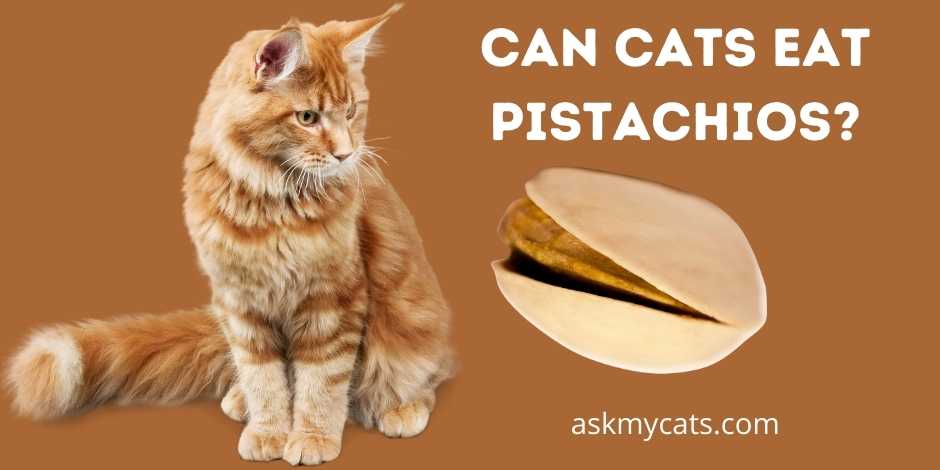

Give Your Cat the Perfect Day
Get the Free Ebook!
Can Cats Eat Pistachios?
No, cats cannot eat pistachios because pistachios are not poisonous to cats, but they do contain fats, which, like all nuts, can cause stomach disturbance in your cat.
Many nuts are also heavily salted, which is harmful to our livestock. Finally, pistachios and their shells can cause choking and intestinal blockage.
Dietary fibre is abundant in pistachios, which is positive news. Foods with high dietary fibre content, on the other hand, have a laxative effect on cats.
While a small amount of fibre in your cat’s diet can help to bulk up his poop and facilitate frequent bowel movements, too much fibre can induce loose stools. Diarrhoea and dehydration are caused by loose stools.
Additionally, the cat’s digestive system will not be able to absorb pistachios as well as it does animal protein. Bloating and gassiness are the most common side effects.
Can Cats Eat Pistachios Pudding?
No, you should not give pistachios pudding to cats because cats are allergic to dairy products.
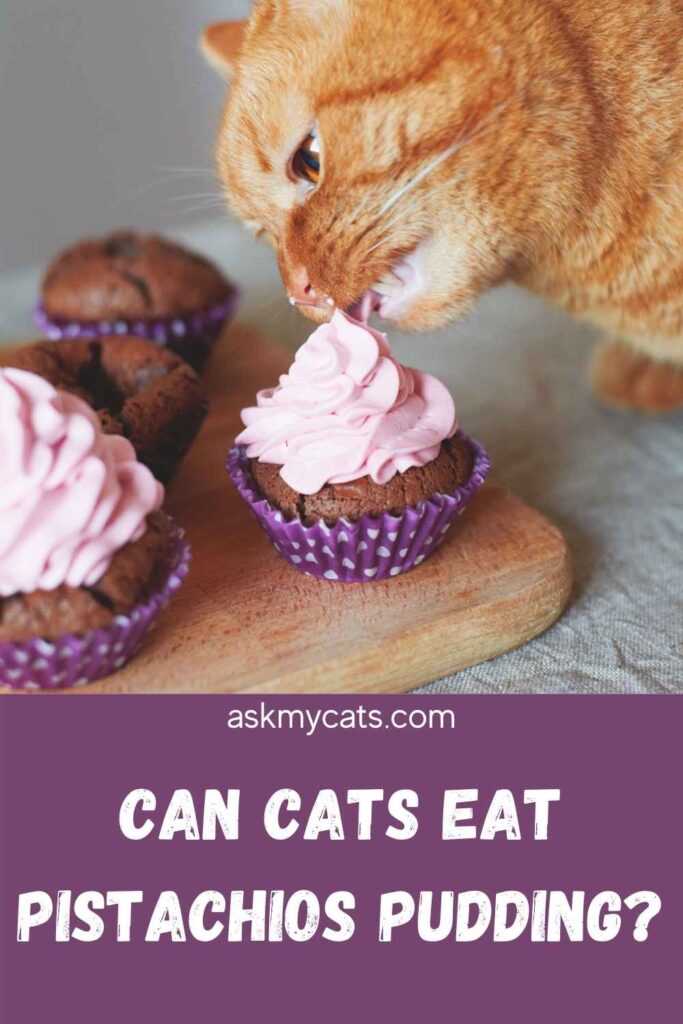
Pistachio pudding is a common dessert choice among humans. What about cats, though?
We’re both aware of how much cats like ice cream, pudding, and nearly every other dairy food. Will cats eat pistachio pudding if they shouldn’t eat pistachios?
We all have an image of cats drinking milk from a saucer in our heads. However, I came across a fascinating piece of history on.
Before kitty dietitians prohibited the procedure, it was popular to offer cats bread soaked in milk for breakfast in the early twentieth century.
Cats are drawn to the flavour and consistency of puddings, ice cream, and whole milk, but this does not always suggest that they are well.
They will have difficulty digesting the fat and sugars in ice cream and pudding, much like they do for pistachios’ fats, resulting in digestive issues such as diarrhoea.
Cats, like humans, drink their mother’s milk when they’re young. They get less likely to absorb the lactose contained in milk and cheese as they get older. This suggests that, like humans, they are susceptible to lactose intolerance.
The severity of allergy varies, with some people being able to tolerate more dairy than others; however, you can restrict their dairy consumption to a single small spoonful at most.
Pistachio pudding is not a safe idea for your little kitty’s stomach because pistachios are not an approved food source for cats, and dairy products often face risks.
Pistachios and pistachio pudding are not poisonous to your pet right away. However, since these little fuzzy buddies are even smaller than we are, they are less likely to digest the small quantities of the same foods as we do.
Why Pistachios Are Not Okay for Cats?
Pistachios are not meant for cats because they can bring many complications in a cat’s body.
You may think that since pistachios are good for humans, they are also good for cats, but this is not the case.
There are some explanations why cats should not be permitted to consume pistachios.
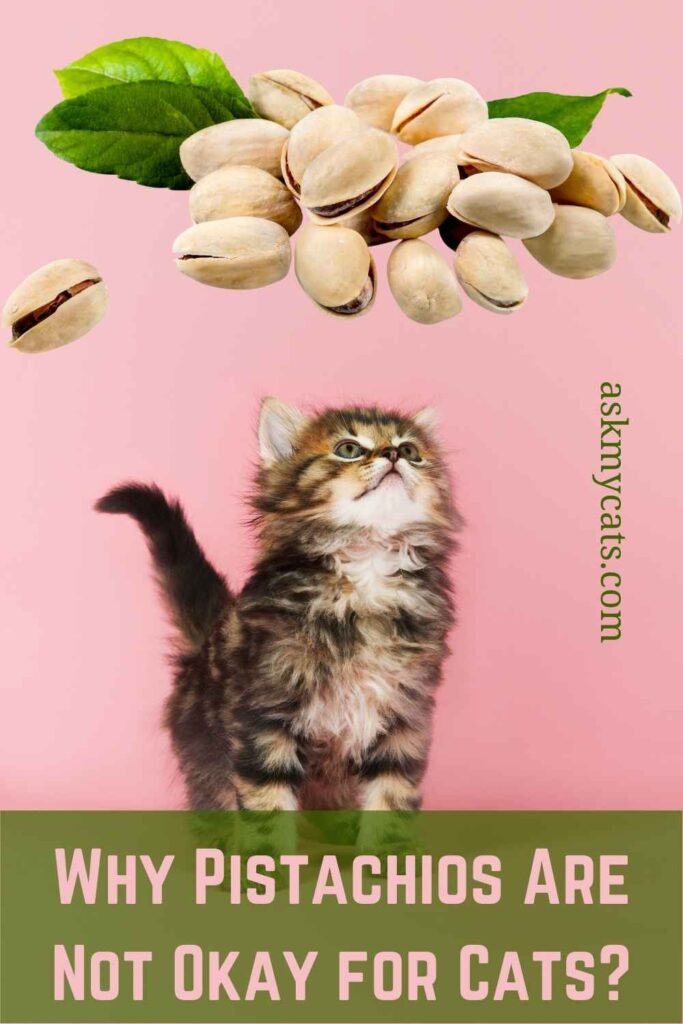
1. Gastrointestinal Distress and Its Consequences
If your cat eats pistachios, one of the more possible outcomes is that she will suffer a kind of gastrointestinal discomfort.
This is because hard-to-digest nuts like pistachios are prone to cause bloating and unnecessary gas in cats.
Even omnivores, who are much better able to digest nuts than carnivorous cats, can become overweight and experience bad gas after consuming so many nuts.
Because of our feline friends’ small scale, even a few pistachios will cause stomach discomfort, so it’s best not to give them any pistachios at all.
2. Foreign Body Obstruction: What Is the Risk?
Foreign body obstruction, which is also exacerbated by ingesting fruit seeds or nut shells, is another chance of feeding your cat pistachios or other nuts.
Simply put, a foreign body obstruction occurs when something becomes lodged in the intestine. It’s a dangerous illness that can cause pain and discomfort. Surgical intervention is often used to remove the foreign body.
3. Flavoring Ingredients That Are Dangerous
We also season our pistachios with a lot of salt, garlic, or onion. These flavouring additives are suitable for humans but not for cats.
Keys, as you already remember, cannot absorb a lot of salt, so any salty food should be avoided.
Garlic and onion are both poisonous to cats, but they aren’t included on the menu.
Pistachios can be beneficial to humans, but they are not beneficial to our feline companions.
If you’re enjoying a bag of pistachios and your cat starts begging you to share them with her, don’t! Instead, give your pet something that is either beneficial for her (such as cat treats) or isn’t detrimental to her.
Can Kittens Eat Pistachios?
No, you cannot provide pistachios to kittens Since kittens are so small and their bodies haven’t completely grown, they are more vulnerable to things than adult cats. As a result, pistachios can never be given to kittens.
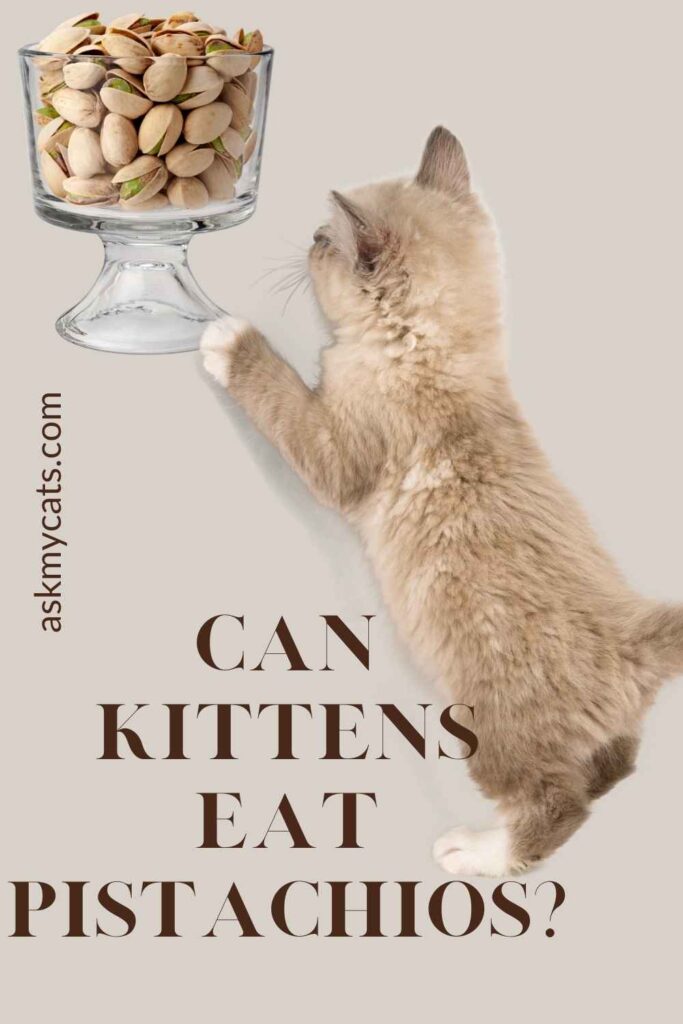
Aflatoxin poisoning is uncommon, although it may make a kitten really ill. Why do you take a chance?
Furthermore, pistachios are a choking threat. Since kittens have less familiarity with various foods, they may try to swallow the pistachio whole or even consume the shell.
Pistachios are just too risky for kittens.
Humans may benefit from pistachios. They’re called a nutrient-dense food because they’re high in vitamins, minerals, fibre, and good fats.
It’s important to keep in mind, though, that cats’ digestive processes are somewhat different from ours. This means they digest food in a very different way to humans.
To begin with, cats are obligate carnivores, which means they only need meat to survive. Cats are simply terrible at getting calories from non-meat sources.
Cats, for example, do not need fibre in their diet. In reality, fiber-rich food can help cats relieve constipation.
Since cats process fat differently than humans, they don’t have to be as concerned with the kinds of fat they consume.
Cats will eat a diet that is higher in lipids, particularly saturated fats, in comparison to their body weight without experiencing any harmful consequences.
The biggest issue with feeding a high-fat diet to cats is that they can become overweight.
Cats and Pistachios – What You Need to Know
Pistachios, like almonds, aren’t actually nuts. They’re really the seeds of the Pistacia vera tree.
Pistachios were first domesticated in Persia, in what is now known as Iran. Pistachios have been consumed for at least 9,000 years, according to archaeological reports.
When not properly stored, pistachios have been known to host the Aspergillus fungus. This fungus has already been attributed to a deadly liver failure outbreak in dogs.
Contamination and poisoning of this kind are uncommon. While the disease was limited to dogs, it’s possible that eating Aspergillus-tainted pistachios could make your cat or kitten sick as well.
Harmful Effects Of Pistachios On Cats
Pistachios are unlikely to hurt your cat in general. Pistachios, on the other hand, have very little nutritional value to cats, who get the most of their calories from poultry.
Dietary fibre is abundant in pistachios. Indigestion and loose stools can occur if your cat consumes too much fibre from consuming too many pistachios.
Furthermore, the fungus Aspergillus can be found in pistachios. This fungus produces a toxin that can induce aflatoxin toxicosis in your animal.
Aflatoxins will make your pet ill or even destroy them. Aflatoxin toxicosis can cause the following symptoms:
- Laziness
- Deficiency
- Appetite damage.
- Throwing up
- Diarrhoea of blood or dark tarry stools
- Mucous membranes that are yellow in colour
- Convulsions
If your cat eats pistachios and develops some of these signs, call poison control and your veterinarian right away!
Alternatives to Pistachios for Cats
If your cat is obsessed with pistachios, try feeding them a cat food that looks like pistachios but is also good for them. You may also offer them some green treats, which are sure to please your pet.
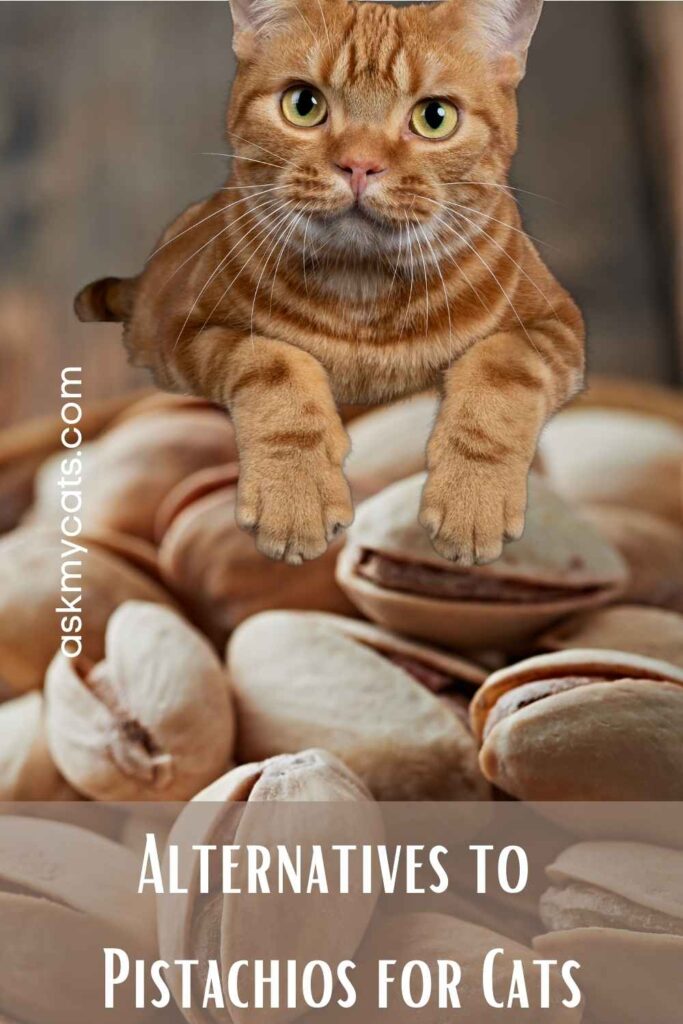
And, if you simply adore the flavour of pistachios and feel compelled to share your pleasure with your adult cat, try sometimes serving them a little scoop of pistachio ice cream.
Pistachios in tiny doses or a few bites of pistachio ice cream should be perfect for your adult pet. In reality, most cats would probably see pistachios as a toy to play with.
However, if you can’t keep your cat away from the pistachios, here are several suggestions:
Instead of genuine pistachios, buy a nut-shaped cat food and/or some organic green cat treats. It’s possible that they won’t notice the difference.
Pistachios should be stored in a locked drawer or fridge.
If your cat does manage to consume some pistachios, look for signs of aflatoxin poisoning, such as lethargy, nausea, loss of appetite, vomiting, bloody diarrhoea or black-tarry stool, yellow mucous membranes, and potentially seizures.
And, if any of these signs appear, call animal poison control and take them to the doctor right away!
Pistachios are not harmful to humans, but they are unhealthy for them, and the flavouring on pistachios can also be dangerous to cats.
Many people advise against feeding pistachios to cats because they can cause them to choke. If your cat attempts to swallow one whole, it can get lodged in its throat and obstruct its breathing.
Pistachios are also difficult to eat for a cat’s stomach, and they are heavy on a cat’s liver. Eating too much will give your cat a stomach ache, and eating them in a constant stream for an extended period of time will damage your cat’s liver.
If your cat has eaten pistachios before, you should not need to be concerned because it was a huge quantity.
Some cats, like humans, are allergic to nuts, including pistachios. If your cat seems to be having an allergic reaction, you can take it to the veterinarian as soon as possible.
It’s better if you don’t give your cat some kind of nut.
Despite the fact that this pistachio ad features a cat, you do not feed them to your cat!
Frequently Asked Questions
Do cats not like pistachio ice cream?
Cats are drawn to the flavour and consistency of puddings, ice cream, and whole milk, but this does not always suggest that they are well. They will have difficulty digesting the fat and sugars in ice cream and pudding, much like they do for pistachios’ fats, resulting in digestive issues such as diarrhoea.
Can animals eat pistachios?
While pistachios have some health benefits and are not poisonous to dogs, their high fat content may make them ill if consumed in large quantities. The high fat content in nuts like pistachios, pecans, and macadamia nuts can induce vomiting and diarrhoea in dogs, according to the ASPCA.
Is it OK to eat pistachios everyday?
Pistachios are a nutrient-dense snack. They have a number of health advantages, especially for the heart, gut, and waistline. Eating pistachios on a regular basis can help to improve one’s health and well-being. However, people should limit themselves to one ounce of plain, unsalted pistachio nuts in their shells every day.
Final Words
Pistachios are high in fibre, vitamins, and unsaturated fat, both of which will help you maintain a healthy blood sugar, blood pressure, and cholesterol level. Because of the fibre and protein in them, you can stay fuller for longer.
This fibre will also help “healthy” bacteria in your gut, which is beneficial. But none of these benefits can be helpful for your cat, so be very careful before feeding them pistachios!
Please let us know if you have any concerns or would like to post a story about your cat and a nutritious snack they love in the comments section below; we’d love to hear from you.
